The world's first AI opera was co-written by GPT-3 - review
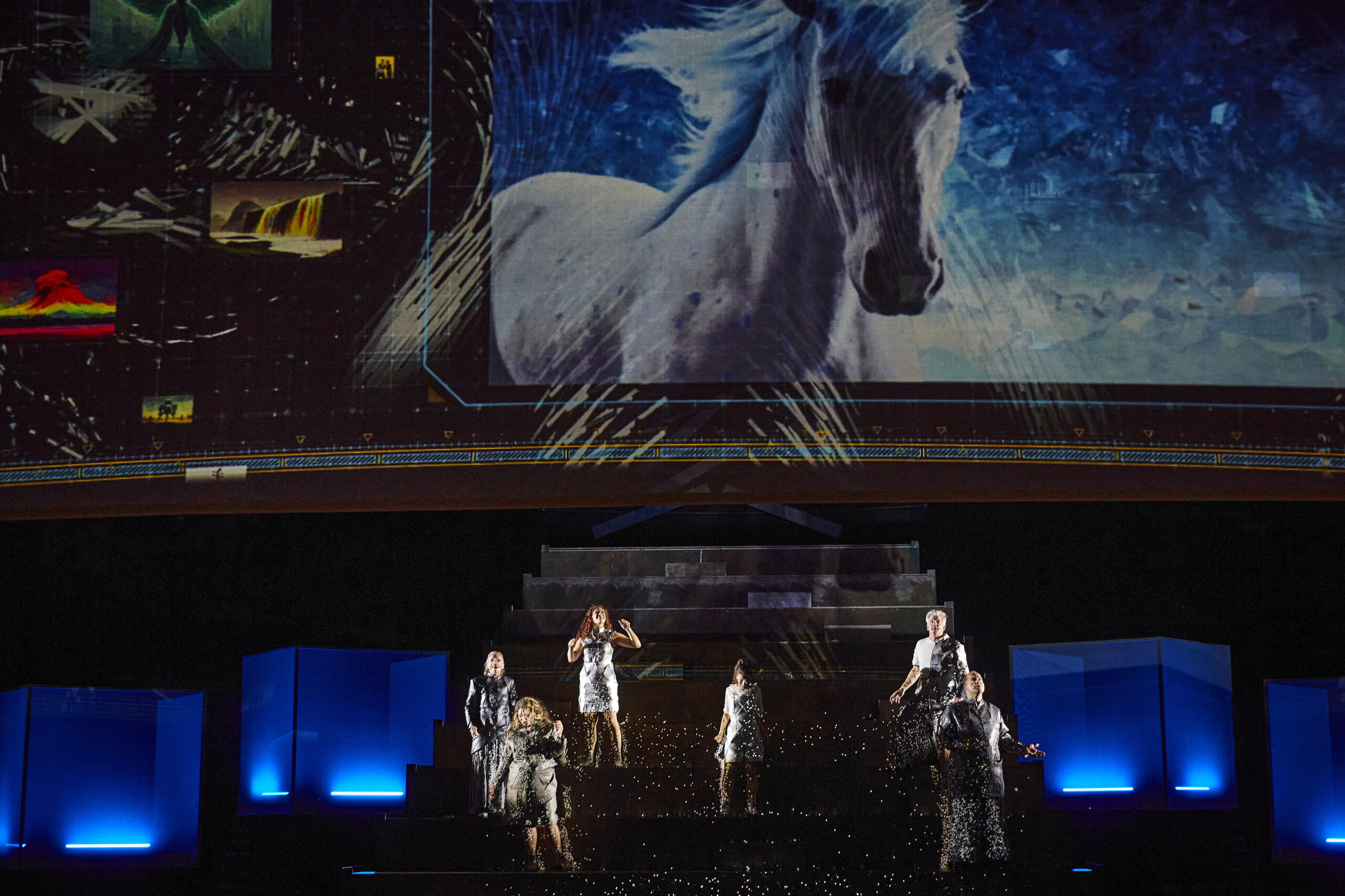
The AI opera "chasing waterfalls", which premiered at the Dresden Semperoper on 03 September, raises questions about human existence in our digital age dominated by powerful technologies, algorithms and machines. True to the signs of our times, hardly any enlightening answers are given. But the complexity of the ambitious performance is surprising.
What happens when the boundary between man and machine becomes increasingly blurred? To what extent do the virtual world and automated decision-making processes already intervene in our everyday lives? When are we human, when are we externally controlled robots?
The cross-media opera production, which was created with the participation of several artist collectives, opera singers, musicians from the Sächsische Staatskapelle Dresden, and IT experts, revolves around such questions. According to the organizers, it is the first time in the world that artificial intelligence has taken on a leading role, composing, writing lyrics, and singing in real-time.
I am me, am I not?
"Not convinced you are not a robot. Please try again" - these are the words with which the protagonist, Norwegian soprano Eir Inderhaug, is greeted by her computer at the beginning of the opera piece when she logs on in the morning.
When she succeeds in proving her human identity to the machine only after countless desperate attempts, it becomes clear: This is about much more than a mere opera experiment with artificial intelligence, but about the existential question of our being today, about who determines who we are.
The rest of the event will show how far the interplay between the analog and virtual worlds has advanced today, and how this opens up a whole spectrum of personal identities for the individual.
After all, our digital manifestations, our self-created digital twins, are often extreme images of ourselves: more perfect, happier, and more successful, but also more emotional, curious, addicted, and volatile.
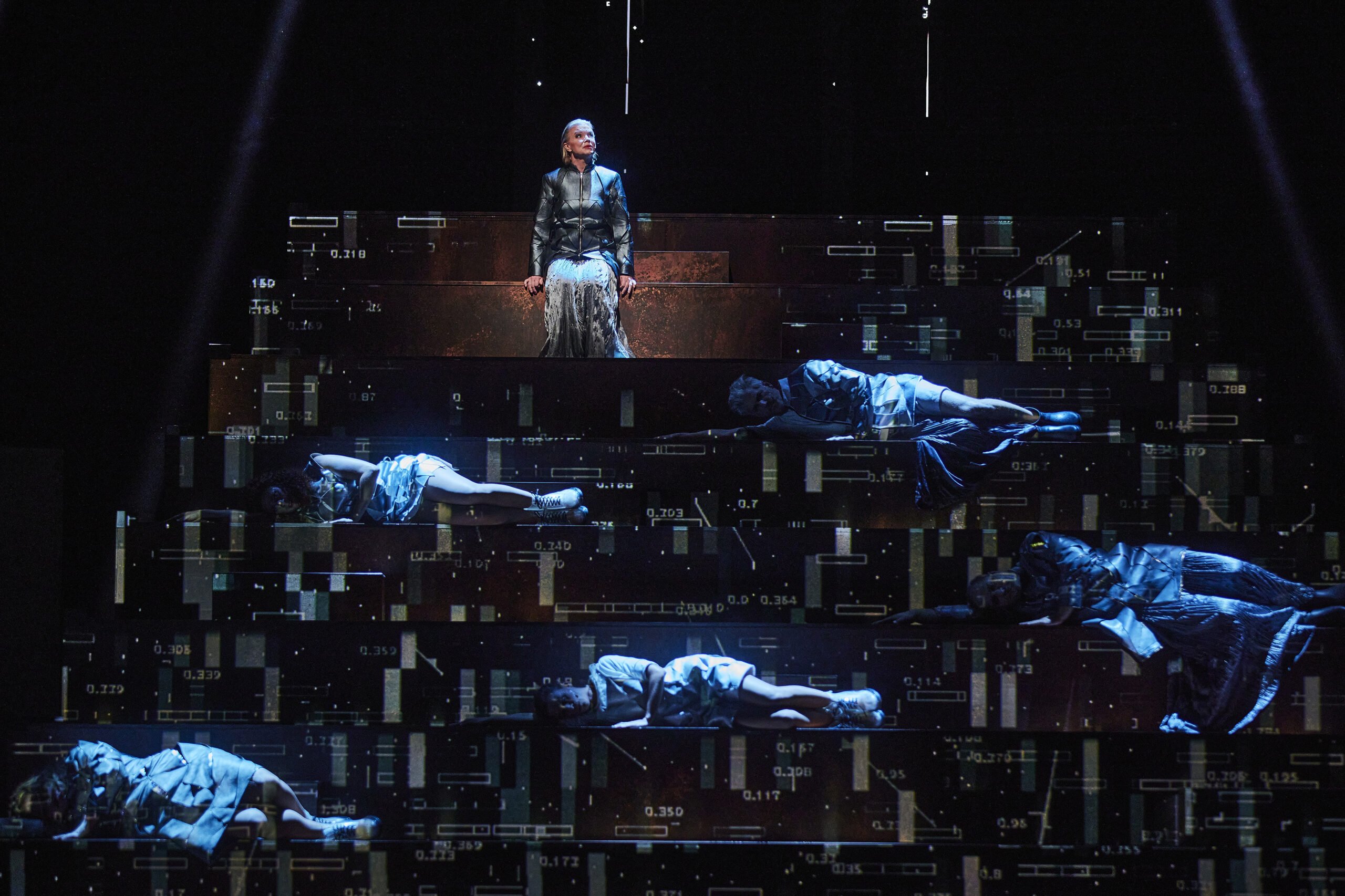
In the play, they are embodied by the questioning child, the deceptive appearance, the longing for success, the gnawing doubt, and the promise of happiness, each of which surrounds and interacts with the protagonist as independent figures.
As another digital identity, the AI itself is integrated into the stage set in the form of an eight-meter-high kinetic light sculpture made of LED panels, creating a mysteriously sparkling aesthetic.
Interdisciplinary collaboration with AI
What is refreshing about the production is the literally real waterfall that rushes across the stage like a constant stream of consciousness or data. And the fact that artificial intelligence is not only the subject of the opera's content, but was also formally involved in its creation, also speaks for the ambitious concept: OpenAI's AI-driven language model GPT-3 was used, for example, in writing the libretto, the text part of the opera.
For the author Christiane Neudecker from the artist collective phase7 performing.arts Berlin, this even gave rise to the idea of creating an entire scene live through the AI, both textually and vocally.
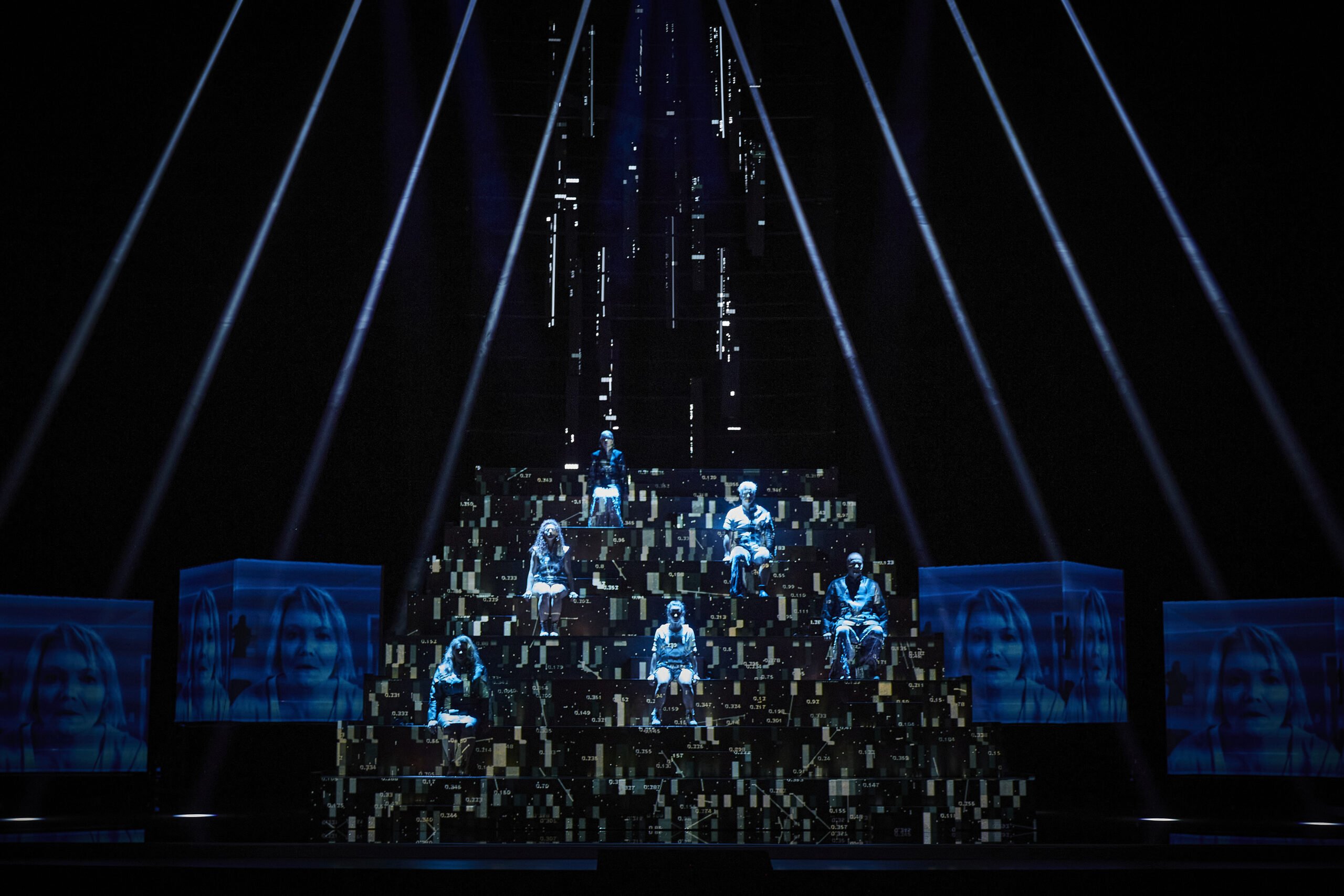
The score, a collaborative project between Hong Kong composer Angus Lee and Berlin-based Studio for Sonic Experiences "kling klang klong", was also partially composed by an AI.
While Lee handled the classical part of the composition for six vocal voices and nine instrumentalists, kling klang klong supplemented the composition with electronic soundscapes and the contribution of the singing AI, which was initially trained with the voice of soprano Inderhaug using children's songs.
In this way, a complex, multi-level interplay of different art and sound levels is created, in which sometimes the conductor, sometimes the pre-programmed AI sets the pace, optionally in combination with instruments, with electronics, with real singing or also as a solo contribution of the AI voice.
Artful perspective on a political problem
Flashing hashtags and @ mentions in a beaming stream of data, likes and follower counts become a satire on the reality of our digital lives as they flit across the screen along with 3D face scans of opera-goers.
One could also recognize in it a political statement on the now common behavioral patterns in our brave new digital world: Having been fed toxic language, the AI literally creates outcries in arias, engages in its own hating and shaming, and thus artificially and artistically creates an extremely unconventional and valuable distance to the social problem of hate speech.
Seeing this phenomenon in an otherwise more traditional opera shows, by stark contrast, the absurdity of the most unattractive excesses of our digital world.
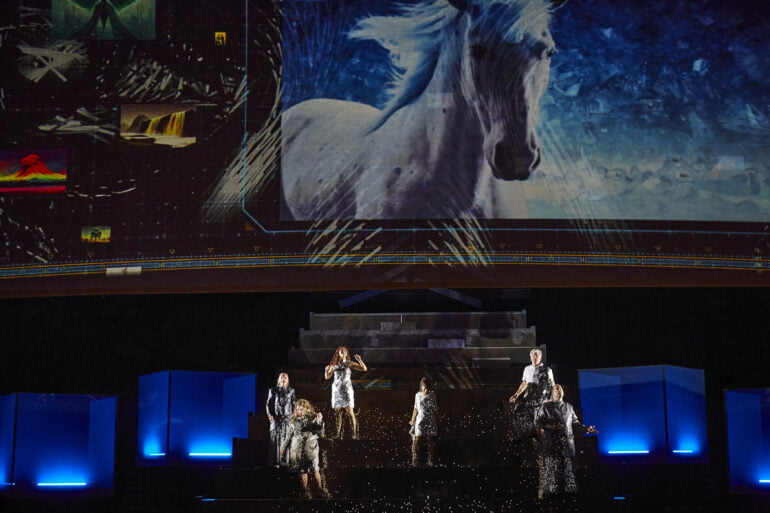
So, the question arises whether happiness might be more than many followers. Whether there might still be a promise of liveliness hidden in the supposedly disappearing, rushing stream of data. Whether, in the midst of the stream of consciousness superimposed by the digital spectacle, humans might still have a sense of the joy of being able to breathe oh so easily.
Man as a weak point in the system
Meanwhile, the pre-programmed AI thinks about its existence in a dream, enacting itself. This is the part of the opera that makes each performance unique: OpenAI's text AI GPT-3 was simply asked to write an aria for an opera about its life as artificial intelligence.
The performance is indeed surprising and impressive - that certainly makes it unique, but artificial intelligence in the sense of a human one is not.
For only man can assert himself against these logically justified and yet distorting excesses of his self and assert the meaning of his existence through his own creative sovereignty. Thus, at least in the opera, it is still recognizable which parts were created by artificial intelligence and which by a human one. And also the plot partly lags behind the AI machinery, including the brilliant water and light spectacle.
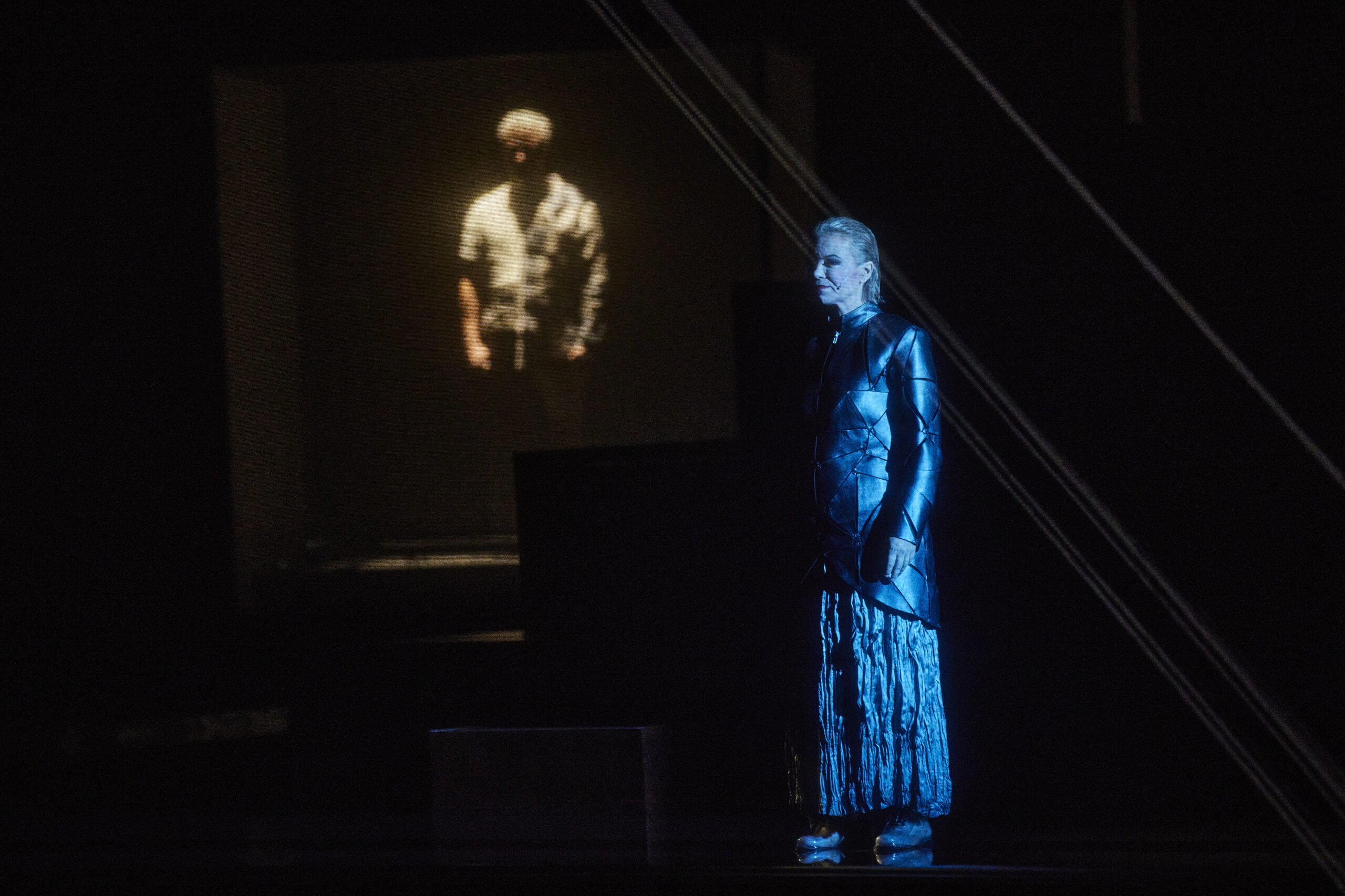
This is precisely what makes the piece sometimes alienating, but at the same time attractive and sympathetic. It would be much more uncanny if human creativity actually became superfluous one day and an AI could create art as brilliantly as a human. After all, it is precisely the idiosyncrasies that do not follow any logical pattern that make us human and therefore cannot be replicated by machines.
It will be exciting to see whether this AI production remains an experiment without imitators - or whether AI technologies can be incorporated into formerly more traditional art forms like opera in the future without having to make themselves the subject of discussion. Likewise, it's possible that cross-media productions like this one will succeed in attracting more people from a wider audience to opera.
AI News Without the Hype – Curated by Humans
As a THE DECODER subscriber, you get ad-free reading, our weekly AI newsletter, the exclusive "AI Radar" Frontier Report 6× per year, access to comments, and our complete archive.
Subscribe nowAI news without the hype
Curated by humans.
- Over 20 percent launch discount.
- Read without distractions – no Google ads.
- Access to comments and community discussions.
- Weekly AI newsletter.
- 6 times a year: “AI Radar” – deep dives on key AI topics.
- Up to 25 % off on KI Pro online events.
- Access to our full ten-year archive.
- Get the latest AI news from The Decoder.